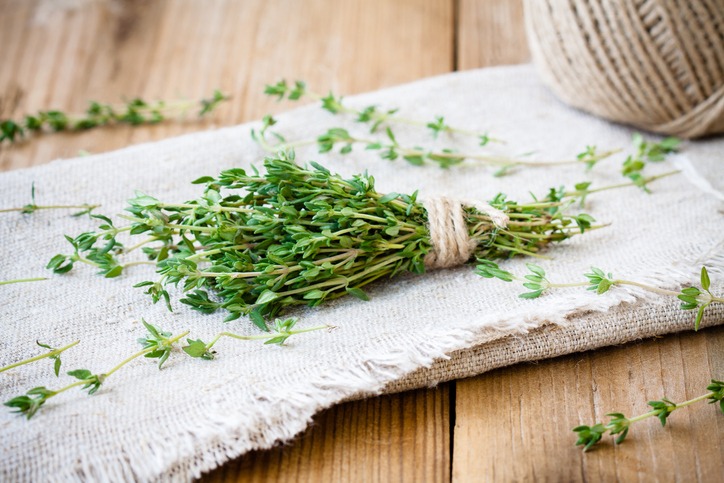There are a few things that a sprig of thyme won’t make better. This herb blends well with a lot of flavors and is packed with health-promoting vitamins, compounds, antioxidants, and other nutrients. Considering how much you probably use it in the kitchen and for its various medicinal uses, it is better if you grow your own in your garden.
What is Thyme?
Thyme is an evergreen herb that belongs to the genus Thymus, which is part of the mint family and is related to oregano. It blooms with small pink, white, or purple flowers. They hybridize easily and grow quickly in sunny areas with well-drained soil.
Native to the Southern Mediterranean regions, this perennial herb is known around the world for its therapeutic and culinary uses. While this herb livens up dishes, it also comes with numerous uses. There are more than 300 varieties of thyme, and each has unique flavors and applications for cooking, medicines, oils, and decoration. The most commonly used and cultivated thyme is Thymus vulgaris.
Benefits of Growing Thyme in Your Garden
Here are the reasons why it’s an excellent time to plant thyme in your garden:
It’s easy to grow.
When it comes to growing fresh herbs, thyme is easy to cultivate. It grows even in less than stellar soil conditions. Thyme doesn’t need a lot of care. It’s a low-maintenance plant that thrives in rocky or dry areas, and it can easily withstand drought and below-freezing temperatures. Depending on the location where you plant them, you might even be able to harvest fresh thyme during the winter months.
It’s a great plant to grow in a plant bed, but it also grows well in a pot placed either outdoors or on a sunny windowsill.
It’s a delicious herb.
Thyme is a Mediterranean herb that can be used both fresh and dry in the kitchen. It can take on a starring role on its own or provide a backdrop for flavorful ingredients.
It’s commonly added as a dried herb in poultry, such as in roasted chicken or poultry. Fattier fish like salmon and trout pair well with thyme. This herb also goes well with mushrooms, especially foraged ones like chanterelles.
Fresh thyme can also be added to baked goods. When used judiciously, it’s mild enough that it won’t overpower the taste of your baked food but adds just enough flavor to add brightness to the finished product.
You can also use thyme to put a grown-up spin on a childhood favorite macaroni and cheese.
It attracts pollinators and beneficial insects.
Thyme attracts a wide variety of pollinators, thanks to its pretty pink, lavender, or white-colored flowers. They attract honey bees, bumblebees, mason bees, and leafcutter bees. It also attracts lacewings, a beneficial insect for egg-laying habitats. Thyme keeps away these harmful insects.
It’s a pest repellent.
The strong scent of thyme confuses pests who like to devour plants. This is why it’s great to plant around the perimeter of your vegetable garden and underneath fruit trees. Adult lacewings love to lay their eggs on the leaves of thyme plants and feed on the nectar found in thyme blossoms. Lacewing larvae eat common garden pests like whiteflies, aphids, and cabbage moth caterpillars.
Thyme essential oil can be used to repel mosquitos and ticks when applied topically. It’s a common ingredient in many pesticides and is used to target bacteria and viruses like rats, mice, and other animal pests.
It reduces erosion.
Reducing and preventing soil erosion is an important goal in our gardens and landscapes. Thyme is an herb that can help reduce erosion – thanks to its deep, fibrous roots. Thyme is perfect for growing in erosion-prone areas and slopes.
It supports the immune system.
Getting all the vitamins your body needs every day can be hard. But the great thing about thyme is that it’s packed with vitamin C and is also a good source of vitamin A, both of which play a critical role in immune function. It’s an excellent herb to keep you from colds during the winter. If you feel a cold coming on, thyme can help you feel better. Thyme is also a great source of fiber, copper, and iron.
It soothes my sore throat and cough.
Thyme can be very helpful when you feel a cold or flu coming on. It has natural antispasmodic and bronchodilator properties – in other words, it can help soothe persistent cough and sore throat. You can make a homemade cough syrup using thyme, which can also calm sore throats due to coughing, tonsillitis, and laryngitis.
When mixed with ivy leaves, thyme essential oil can alleviate coughing and other bronchitis symptoms. Try drinking some thyme tea the next time you’re faced with a cough and sore throat, and it will give you relief.
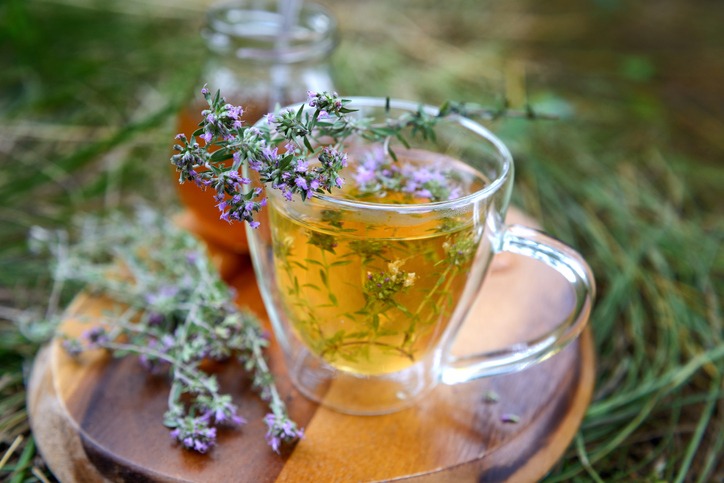
It lowers blood pressure.
According to a study, thyme is found to be helpful in significantly reducing the heart rate in rats with high blood pressure and lowering their cholesterol. Rats respond to hypertension the same way as humans, so one sure way to use thyme to help lower your blood pressure and heart rate is to substitute it for salt in your dishes.
It acts as a natural preservative.
A study has found that, even at low concentrations, thyme oil can be an effective natural preservative of food products against several common foodborne bacteria that can cause illnesses. Thyme oil was found to be effective against resistant strains of staphylococcus, Escherichia, Enterococcus, and Pseudomonas bacteria.
Another study found that thyme might be a potent antioxidant for stabilizing sunflower oil, prolonging its stability at different temperatures – thus, preserving its quality, nutritional value, and shelf life.
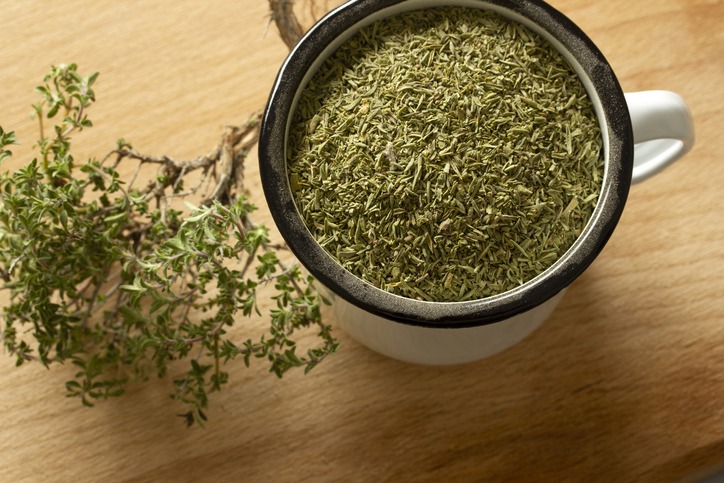
It has antimicrobial and antifungal properties.
Did you know that before antibiotics were invented, thyme was used to medicate bandages? It is because thyme contains thymol, a naturally occurring chemical compound with strong antiseptic properties. This compound is also a common ingredient in mouthwash and natural deodorants. Historically, thyme has been used to treat symptoms of tooth decay, plaque formation, and gingivitis.
When combined with a carrier oil, a thyme essential oil can be used to treat common fungal infections and growths such as ringworm, toenail fungus, and athlete’s foot.
Research assessing the benefits of thyme essential oil antifungal cream for eczema-like lesions found that a 3 percent thyme essential oil cream can be able to treat and heal mild to moderate cases of fungal infections.
It helps prevent yeast infections.
Candida albicans (C. Albicans) is a common cause of yeast infections in the mouth and vagina, a recurring condition called “thrush.” Thyme essential oil is effective in destroying C. Albicans fungus in the body.
It can fight cancer.
Thyme can help in protecting the body against colon cancers and breast cancers. A study has found that extracts of mastic thyme might protect people from colon cancers. Another study that looked at the effect of wild thyme on breast cancer activity found that wild thyme caused cell death in breast cancer cells.
Contains Manganese
A great thing about thyme or thyme tea, in particular, is that it contains manganese. People who are often facing bone issues are recommended to drink thyme tea as it is a natural healer because of manganese. Besides, manganese also helps in reducing issues associated with blood clotting. Blood clotting is one of the foremost reasons why heart attacks occur and regular consumption of thyme will make sure that your blood vessels are in a healthy and balanced position.
If you are interested in having a house garden, here are the best plants you can consider – Best Houseplants for Your Home
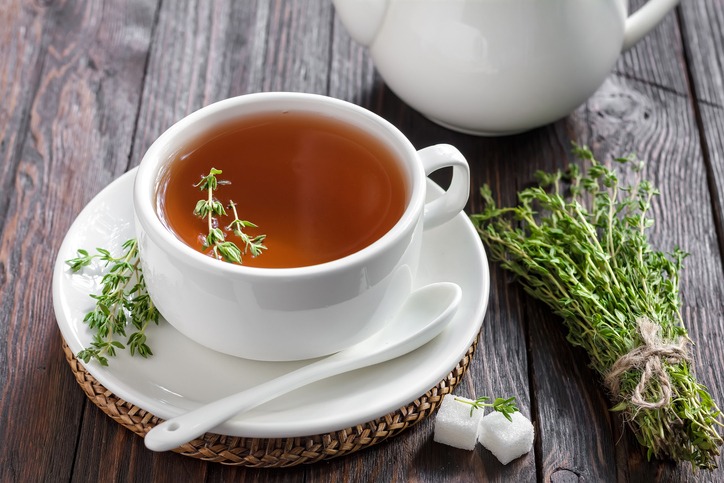
Fighting Acne
The increase in pollution, as well as stressful work routines, have led to a significant increase in acne among many. If you are against any form of chemical treatment for fighting acne, or you have tried many over-the-counter medicines and creams but none worked out, you should try out thyme. Thyme essential oil can be used on the skin where acne is growing. You will see good results in a matter of days. This is possible because of the antibacterial properties of the plant. Besides, one study conducted with thyme essential oil suggested that it fights actively against P.acnes, a bacteria known to be the root cause of acne.
Improves Digestive Distress
Many people face digestive issues at times. In such issues, thyme can be of great help due to its antimicrobial properties. Not only do they reduce germs in the food but also improve the overall thyme health. As the germs are reduced from your food, you are able to digest it better and not face any kind of food poisoning later on as well. Besides, there are various studies that have proven that thyme helps in supporting healthy liver function as well as increasing the gastric mucus layers in the stomach. Overall, it is a great vegetable you can add to every diet for improving digestive distress. This makes it a great reason to have a thyme plant at home.
Gives your garden a great look.
One of the most important reasons why anyone should have a thyme plant at their home is because of the natural beauty of this plant. It gives a great fragrance to the garden as well as adds more to the scenic beauty as well. Some people can grow thyme inside their homes as well and enjoy the natural fragrance inside their homes at all times.
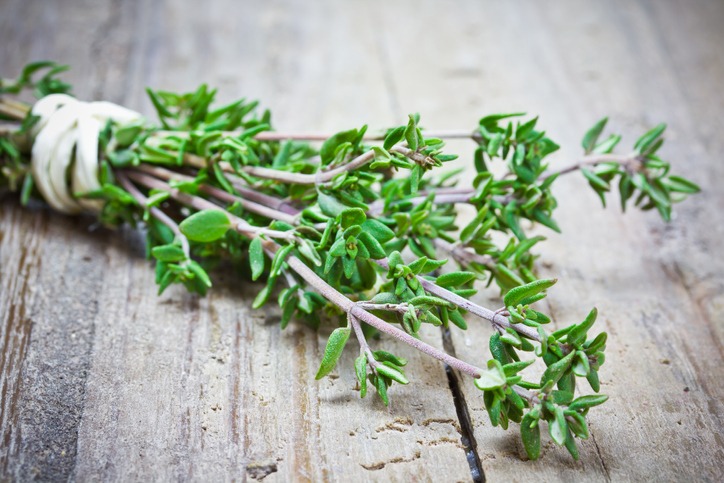
May Improve Mood
Although there is limited evidence to support this benefit, thyme is known to be used for aromatherapy as well. The aromatic purposes of this essential oil may increase the concentration of serotonin and dopamine. These are essential elements in the body that help us feel happy. Those who use it at night or use it regularly may experience some positive effects on their mood. However, further research is still being conducted to validate this as a solid point. Flowers are also helpful in aromatherapy and you should grow them in your garden.
Conclusion
The thyme plant is of great significance and this is apparent by the fact that thyme has so many benefits as mentioned above. These benefits are not only related to health but also the overall beauty of your home. All these benefits make up good reasons as to why one should have a thyme plant at their home. Growing it is really easy and we suggest that you start today!

